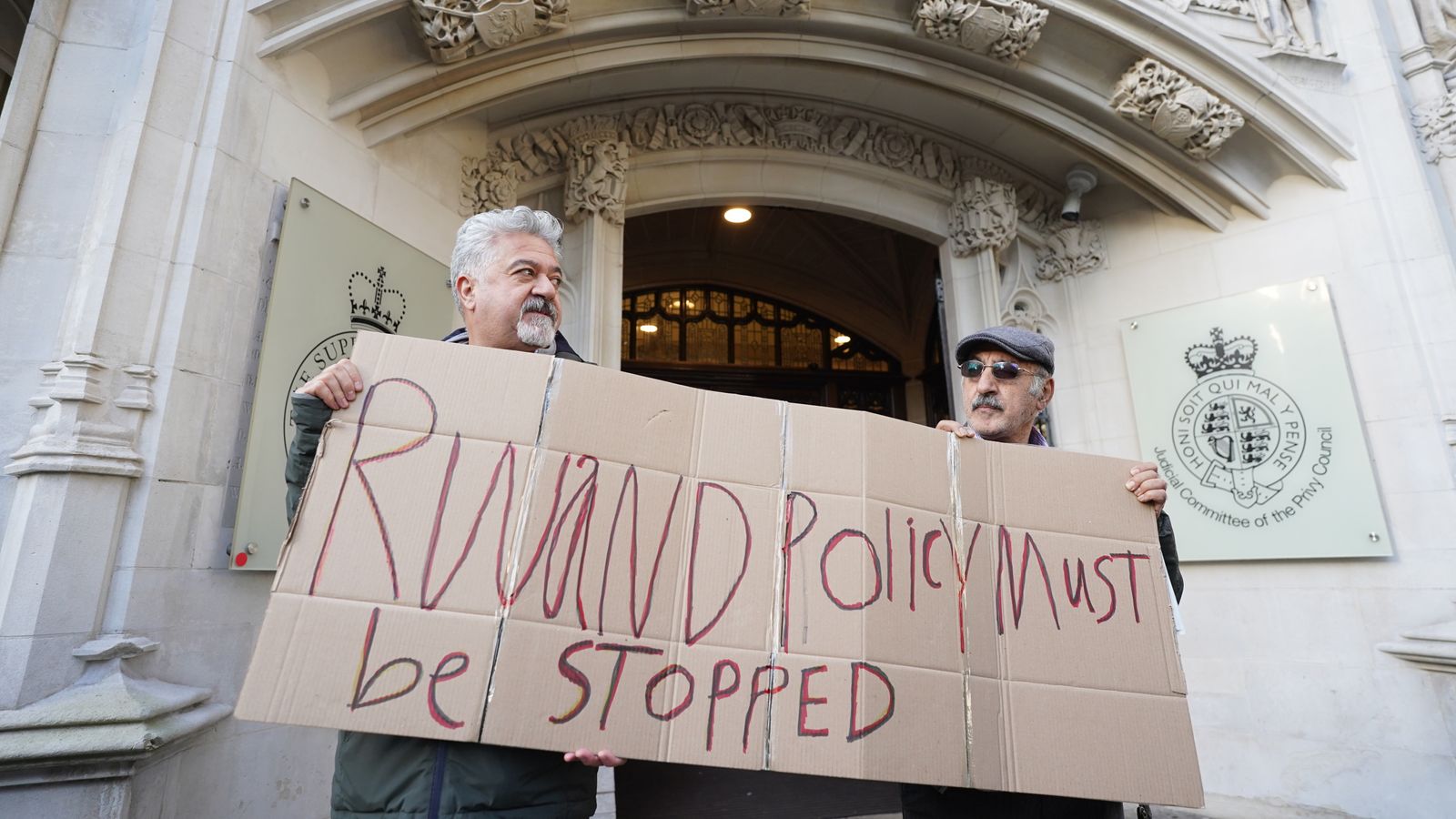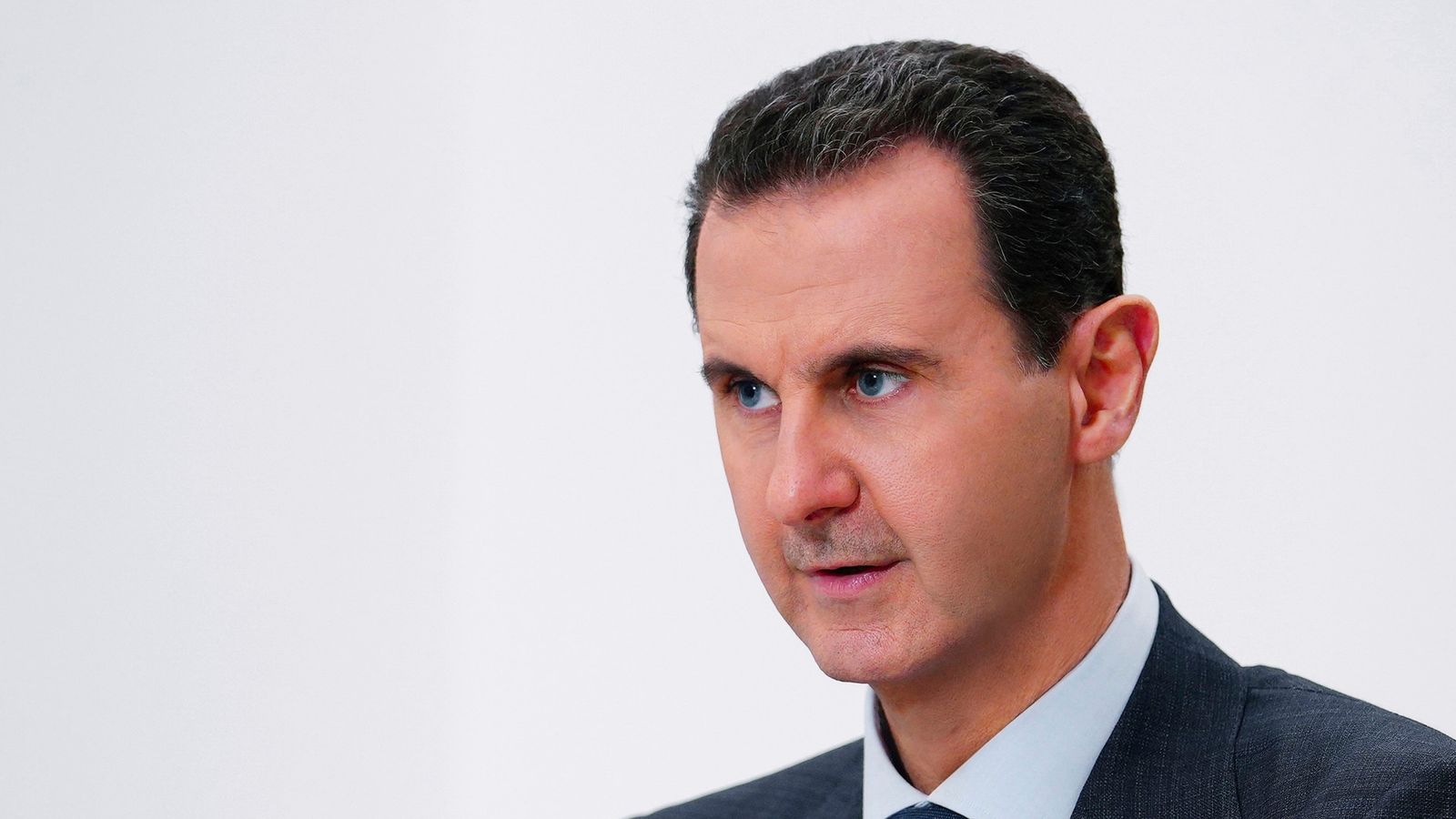The future of the government’s flagship immigration policy, that would see asylum seekers arriving in the UK on small boats deported to Rwanda, is hanging in the balance.
On Wednesday, the Supreme Court ruled the scheme was unlawful, saying those sent to the country would be at “real risk” of being returned home, whether their grounds to claim asylum were justified or not – something that would breach international human rights laws.
But Rishi Sunak has insisted the government will push ahead, making changes he believes will “end the merry-go-round” of legal challenges against the policy.
Politics live: Sunak’s Rwanda plan ‘extraordinary’, says former justice
So what do we know about the prime minister’s plan? And what detail is still lacking?
Fully fledged treaty
The first step the government has announced is to turn its current deal with Rwanda into a fully fledged international treaty.
Blocked Rwanda scheme ‘already having effect’ – home secretary claims
Rwanda ruling could reopen splits in the Tory party – and the stakes are now even higher for PM | Beth Rigby
Labour and the Conservatives agree on Israel-Hamas war for now – but how long can consensus hold?
Mr Sunak said such a document would “address the challenges” of the court ruling, including making it legally binding for the country not to return asylum seekers home.
Please use Chrome browser for a more accessible video player
Giving more detail in a statement to the Commons on Wednesday, Home Secretary James Cleverly said the new agreement would make it clear Rwanda would not be able to send asylum seekers back “to any country other than the UK”.
He argued this would “make it absolutely clear to our courts and to Strasbourg [where the European Court of Human Rights is based] that the risks laid out by the court today have been responded to [and] will be consistent with international law”.
Speaking to Sky News on Thursday, Mr Cleverly said ministers had been working on the treaty for “over a year” in case the Supreme Court decision didn’t go their way, and a final version could be completed “within days, not weeks or months”.
But the exact wording has yet to be made public, and it is not clear what other concerns of the court may be addressed – such as questions over the east African nation’s procedures and institutions for processing asylum claims, and risks that judges and lawyers will not act independently of the government.
Emergency legislation
The second part of Mr Sunak’s plan to keep the Rwanda scheme alive is to introduce emergency legislation in the Commons.
He said the ruling of the Supreme Court confirmed it was within the government’s power to send asylum seekers to a safe third country, and his new law would “enable parliament to confirm that with our new treaty, Rwanda is safe”.
But there is a lack of clarity over how exactly the legislation would achieve this.
Sky News Monday to Thursday at 7pm. Watch live on Sky channel 501, Freeview 233, Virgin 602, the Sky News website and app or YouTube.
The reason Rwanda is not considered safe, as the court put it, is because of an “apparent inadequacy” of the country’s government to understand – and stick by – the obligations of human rights laws, including both the United Nations’ Refugee Convention and the European Convention on Human Rights.
The UK is also signed up to those laws, meaning regardless of what the government puts into legislation at home, the scheme could still be challenged in the international courts which oversee the treaties, and those institutions would have the power to put a stop to deportations.
Read more:
Everything you need to know about the government’s Rwanda plan
Sunak’s new promise looks extremely hard to keep – analysis
Mr Sunak said on Wednesday he would “not allow a foreign court” to block the flights, adding: “If the Strasbourg court [the European Court of Human Rights] chooses to intervene against the express wishes of parliament, I am prepared to do what is necessary to get flights off.”
Some in his party want this to mean the UK leaving the European Convention on Human Rights altogether, but Mr Cleverly told Sky News “we don’t think we’re going to need to” to achieve their goal.
It may instead mean the government puts it explicitly in the text of the bill that human rights safeguards, including the European convention and UN convention, would be disapplied – meaning they were no longer valid grounds in the UK for a legal challenge.
This could upset not just the organisations in charge of keeping signatories of these international laws in check, but other international partners, including the EU – making it tougher for the UK on the world stage.
Please use Chrome browser for a more accessible video player
Alternatively, the new law may just imply the treaties will be disapplied, rather than spelling it out, but then questions arise over how valid it would be if the Rwanda scheme was again challenged by international courts.
Despite consistent pushing by journalists to get to the bottom of this detail, the government has still not confirmed what will be on the face of the bill, so all these questions remain up in the air.
Parliamentary approval
However the wording of the emergency legislation is formed, the government may still face a long fight ahead to get it through parliament.
In the Commons, the battle should be straight forward, as while opposition parties continue to call the Rwanda plan “unworkable” and a “gimmick”, the Conservatives have the majority on the green benches, so it will likely pass any votes there.
But it will be a different story in the second chamber, and looks set to become all out war when the Lords scrutinise the bill.
Please use Chrome browser for a more accessible video player
Many peers have already condemned the deportation scheme in its current form, but the new legislation looming over the horizon is causing even more upset.
Former Supreme Court justice Lord Jonathan Sumption told the BBC it was a “profoundly discreditable plan” coming from Downing Street, arguing it would “effectively overrule a decision on the facts, on the evidence, by the highest court in the land”.
And despite his own criticism of the European Court of Human Rights, the peer said the bill “won’t work internationally”, as it would “still be a breach of the government’s international law obligations”.
Be the first to get Breaking News
Install the Sky News app for free
The Lords can delay the bill and send it back to the Commons for changes multiple times, but it will still be MPs that get the final say.
However, with an election looming in the next 12 months, and parliamentary time at a premium, the question remains whether Mr Sunak will even have the time to get his new law onto the statute book.
For now, we will have to wait for more detail and watch as the arguments play out.









